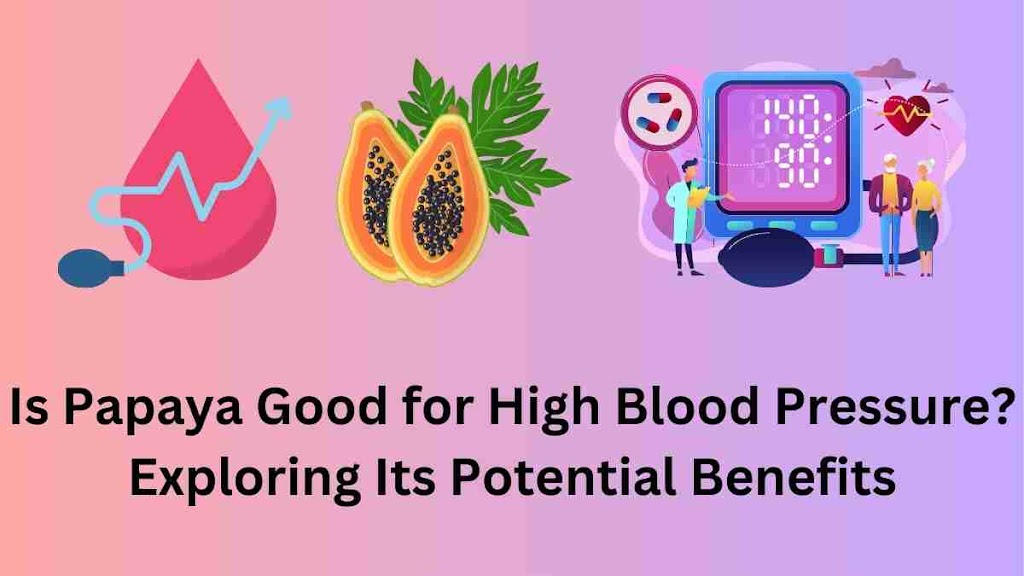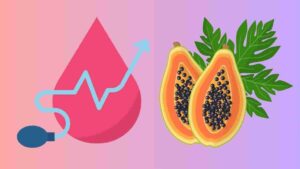Is Papaya Good for High Blood Pressure? High blood pressure, also known as hypertension, affects millions of people worldwide and is a major risk factor for heart disease and stroke. Maintaining a healthy diet plays a crucial role in managing blood pressure levels. One fruit that has gained attention for its potential benefits in this regard is papaya. But is papaya good for high blood pressure? Let’s explore this topic and uncover the potential advantages of including papaya in your diet.
Is papaya Good For High Blood Pressure?
Yes, it is. Papaya has potassium, vitamin C, and antioxidants. They can help lower blood pressure, protect blood vessels, and prevent plaque buildup.
Understanding High Blood Pressure
What Is High Blood Pressure?
High blood pressure, also known as hypertension, is a chronic medical condition characterized by elevated blood pressure levels in the arteries. It occurs when the force of blood against the artery walls is consistently high, putting strain on the heart and blood vessels.
Causes Of High Blood Pressure
Understanding the causes of high blood pressure is crucial in effectively managing the condition. While there isn’t always a specific cause identified, several factors can contribute to its development:
- Genetics: Family history of hypertension can increase the risk of developing high blood pressure.
- Lifestyle Factors: Unhealthy habits such as a sedentary lifestyle, poor diet, excessive alcohol consumption, and smoking can contribute to high blood pressure.
- Age: The risk of developing high blood pressure increases with age.
- Underlying Health Conditions: Certain medical conditions like diabetes, kidney disease, and obesity can contribute to high blood pressure.
- Stress: Chronic stress can affect blood pressure levels.
Symptoms Of High Blood Pressure
High blood pressure is often referred to as the “silent killer” because it may not have noticeable symptoms. However, some individuals may experience:
- Headaches
- Dizziness
- Shortness of breath
- Chest pain
- Irregular heartbeat
Exploring The Nutritional Composition Of Papaya
The Nutritional Benefits Of Papaya
Papaya, a tropical fruit known for its vibrant color and sweet flavor, offers a plethora of nutritional benefits. This delectable fruit is packed with essential vitamins, minerals, and antioxidants, making it a valuable addition to a balanced diet.
Vitamins And Minerals In Papaya
One of the remarkable aspects of papaya is its rich vitamin and mineral content. It is a great source of vitamin C, which is essential for boosting the immune system and promoting collagen production for healthy skin. Additionally, papaya provides vitamin A, which contributes to good vision and supports overall eye health.
Papaya is also a notable source of potassium, a mineral that plays a crucial role in maintaining healthy blood pressure levels. The presence of potassium in papaya makes it an intriguing option for those concerned with high blood pressure.
Papaya And High Blood Pressure
Papaya’s potential benefits in managing high blood pressure have been a subject of interest among researchers. With its high potassium content and low-sodium nature, papaya can contribute to maintaining healthy blood pressure levels. Potassium helps relax blood vessel walls and facilitates the smooth flow of blood, ultimately reducing the strain on the cardiovascular system.
Furthermore, papaya’s antioxidants, such as beta-carotene and lycopene, have been associated with lower blood pressure levels and improved cardiac health. These compounds have been found to reduce inflammation and oxidative stress, which are important risk factors for hypertension.
Incorporating Papaya Into Your Diet
Now that we understand the nutritional composition of papaya and its potential benefits for managing high blood pressure, let’s explore ways to incorporate this tropical fruit into our diet.
1. Fresh Papaya Slices
The simplest way to enjoy papaya is by cutting it into slices and indulging in its natural sweetness. Add it to your breakfast or enjoy it as a refreshing snack throughout the day.
2. Papaya Smoothies
Blend ripe papaya with yogurt or your favorite plant-based milk for a creamy and nutritious smoothie. You can enhance the flavor by adding a squeeze of lime juice or a handful of fresh berries.
3. Papaya Salad
Combine papaya slices with crunchy vegetables like cucumber, bell peppers, and carrots to create a refreshing and colorful salad. Drizzle it with a tangy dressing and sprinkle with some toasted nuts or seeds for added texture.
4. Papaya Salsa
Take your taste buds on a tropical journey by making papaya salsa. Dice papaya, mix it with chopped red onions, bell peppers, cilantro, and lime juice. This delightful salsa can be enjoyed with grilled fish or as a topping for tacos.
Papaya And Its Effect On Blood Pressure
The Role Of Papain In Blood Pressure Regulation
Papain is an enzyme present in papaya that has been found to have potential blood pressure-lowering effects. Studies have shown that papain can help reduce the formation of angiotensin II, a hormone that causes blood vessels to constrict, leading to increased blood pressure. By inhibiting this hormone, papain helps to promote vasodilation, which improves blood flow and helps regulate blood pressure.
Rich In Potassium, Low In Sodium
One of the key factors that contribute to high blood pressure is an imbalance between potassium and sodium levels in the body. Papaya is an excellent source of potassium, a mineral that helps relax blood vessel walls and excrete excess sodium through urine. By consuming papaya regularly, individuals can increase their potassium intake and maintain a healthy balance, ultimately helping to lower blood pressure levels.
Antioxidant Properties And Blood Pressure
The presence of antioxidants in papaya, such as vitamin C and E, can also have a beneficial impact on blood pressure. Antioxidants help combat oxidative stress in the body, which is known to contribute to the development of hypertension. By reducing oxidative stress, papaya’s antioxidants help protect the cardiovascular system and promote healthy blood pressure levels.
Other Health Benefits Of Papaya
In addition to its potential blood pressure-lowering effects, papaya offers a range of other health benefits. It is known to boost digestive health due to its high fiber content, support immune function with its abundance of vitamin C, and aid in weight management due to its low calorie and fat content. By incorporating papaya into a balanced diet, individuals can not only address high blood pressure but also improve their overall well-being.
Top 10 Health Benefits of Papaya
1. Boosts Immune System
Papaya is rich in vitamin C, an essential nutrient that strengthens the immune system. Consuming papaya regularly can help reduce the risk of infections and improve overall health. Its high antioxidant content also helps combat free radicals and protects against cell damage.
2. Supports Digestive Health
Papaya contains an enzyme called papain, which aids in digestion by breaking down proteins. This enzyme can help alleviate symptoms of indigestion and contribute to a healthy digestive system. Additionally, the fiber content in papaya promotes regular bowel movements and prevents constipation.
3. Promotes Heart Health
Research suggests that papaya may be beneficial for maintaining heart health. It is low in cholesterol and high in fiber, which can help lower bad cholesterol levels and reduce the risk of heart disease. The potassium content in papaya also helps regulate blood pressure.
4. Enhances Skin Health
The high vitamin C and vitamin E content in papaya contribute to healthy skin. These vitamins help promote collagen production, which maintains skin elasticity and reduces the appearance of wrinkles. Papaya’s natural exfoliating properties can also help remove dead skin cells and unclog pores.
5. Supports Eye Health
Papaya is rich in beta-carotene, an antioxidant that is converted into vitamin A in the body. Vitamin A is essential for maintaining good vision and preventing age-related macular degeneration. Regular consumption of papaya can help improve eye health and protect against vision problems.
6. Aids Weight Loss
With its low calorie and high fiber content, papaya can be a great addition to a weight loss diet. The fiber helps keep you feeling full for longer periods, reducing the likelihood of unhealthy snacking. The natural sugars in papaya are also less likely to lead to weight gain compared to other high sugar fruits.
7. Supports Healthy Blood Pressure
Studies suggest that papaya may help regulate blood pressure levels. The potassium content in papaya can help counteract the effects of sodium, promoting healthy blood pressure. Additionally, papaya’s high fiber content can contribute to overall cardiovascular health.
8. Boosts Mood And Reduces Stress
Papaya is a good source of several mood-enhancing nutrients, including vitamin B6, folate, and magnesium. These nutrients help regulate neurotransmitters in the brain, such as serotonin, which play a crucial role in maintaining mood balance. Consuming papaya can help reduce stress and promote a sense of well-being.
9. Supports Hair Health
Due to its rich vitamin A content, papaya can help nourish the scalp and promote healthy hair growth. The enzymes in papaya can also remove excess oil and impurities, preventing dandruff and enhancing overall hair health. Applying papaya pulp or seed oil topically can provide additional benefits.
10. Boosts Metabolism
Papaya contains essential nutrients like vitamin B complex, folate, and magnesium, which play a crucial role in energy metabolism. These nutrients help convert food into energy, ensuring proper functioning of various bodily processes and maintaining optimal energy levels throughout the day. Remember, these are just some of the many health benefits of papaya. Regularly incorporating papaya into your diet can help improve overall health and well-being.
The Benefits of Eating Papaya at Night
1. Improved Digestion
Consuming papaya at night can help improve digestion due to its high fiber content. The fiber in papaya promotes regular bowel movements, preventing constipation and promoting a healthy digestive system.
Furthermore, papaya contains an enzyme called papain, which aids in the digestion of proteins. This enzyme can help break down complex proteins and promote their absorption, making it easier for the body to digest and utilize nutrients from the food.
2. Promotes Better Sleep
Eating papaya at night can contribute to better sleep due to its high content of tryptophan. Tryptophan is an amino acid that helps the body produce serotonin and melatonin, which are neurotransmitters involved in regulating sleep patterns.
By increasing the levels of these neurotransmitters, papaya can promote relaxation and improve the quality of sleep. This can be especially beneficial for individuals who struggle with insomnia or have difficulty falling asleep at night.
3. Manages High Blood Pressure
Papaya is considered good for individuals with high blood pressure due to its potassium content. Potassium is a mineral that plays a crucial role in maintaining blood pressure levels. It helps relax the blood vessels, reducing pressure on the arterial walls.
Additionally, papaya is low in sodium, which is essential for individuals with high blood pressure. A low-sodium diet can help lower blood pressure and reduce the risk of cardiovascular diseases.
Moreover, papaya is rich in antioxidants, such as vitamin C and beta-carotene, which can protect the heart from oxidative stress and inflammation, further supporting cardiovascular health.
Frequently Asked Questions For Is Papaya Good for High Blood Pressure?
Is Papaya Good For Weight Loss?
Yes, papaya is considered beneficial for weight loss due to its low calorie and high fiber content. It helps to keep you feeling fuller for longer, aids digestion, and promotes healthy bowel movements, thus supporting weight management efforts.
Who Should Not Eat Papaya?
Individuals who are allergic to papaya should avoid consuming it. Additionally, pregnant women are advised to limit their consumption of papaya, especially the unripe varieties, as they contain high levels of latex which may stimulate contractions and pose a risk during pregnancy.
What Organ Is Papaya Good For?
Papaya is particularly beneficial for digestive health and supports the proper functioning of the digestive system. It contains an enzyme called papain, known for its digestive properties, which aids in breaking down proteins and promoting efficient digestion. Moreover, the high fiber content in papaya contributes to a healthy gut and regular bowel movements.
Is Papaya Good Or Bad For Kidneys?
Papaya is generally considered safe and beneficial for kidney health. It is a rich source of antioxidants and contains a high water content, which helps to support proper hydration, essential for kidney function. However, individuals with existing kidney conditions or undergoing specific treatments should consult with their healthcare provider regarding their papaya consumption.
Is Papaya Good For Lowering Blood Pressure?
Yes, papaya is good for lowering blood pressure. It is rich in potassium, a mineral that plays a vital role in regulating blood pressure levels. Potassium helps to counterbalance the effects of sodium, which can lead to high blood pressure. Including papaya in a balanced diet along with an overall healthy lifestyle can contribute to maintaining normal blood pressure levels.
Conclusion
papaya can be considered as a beneficial fruit for individuals dealing with high blood pressure. Its natural properties, including vitamin C, potassium, and fiber, contribute to its potential effectiveness in regulating blood pressure levels. Incorporating papaya into a well-balanced diet can provide essential nutrients while working towards maintaining a healthy cardiovascular system.




